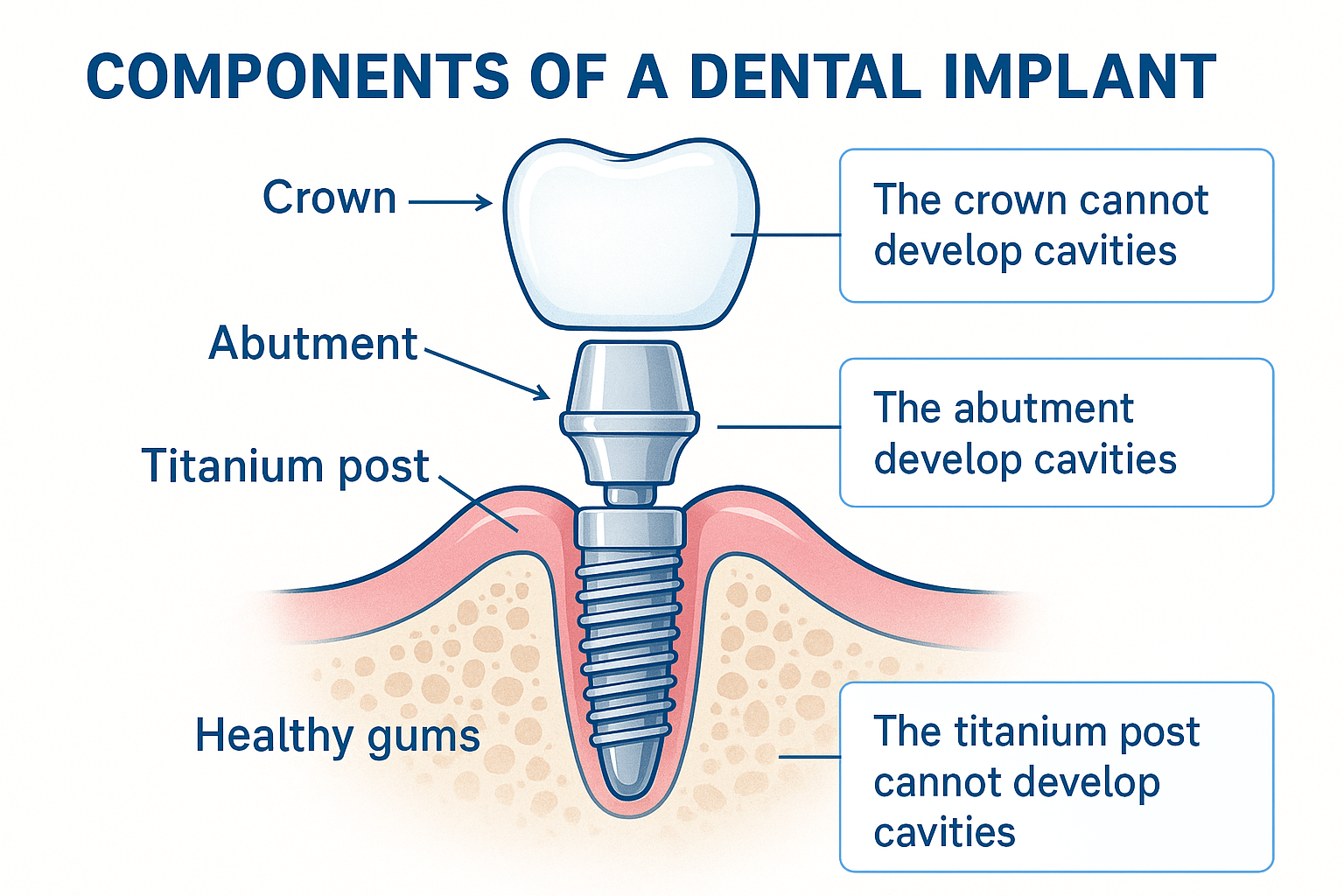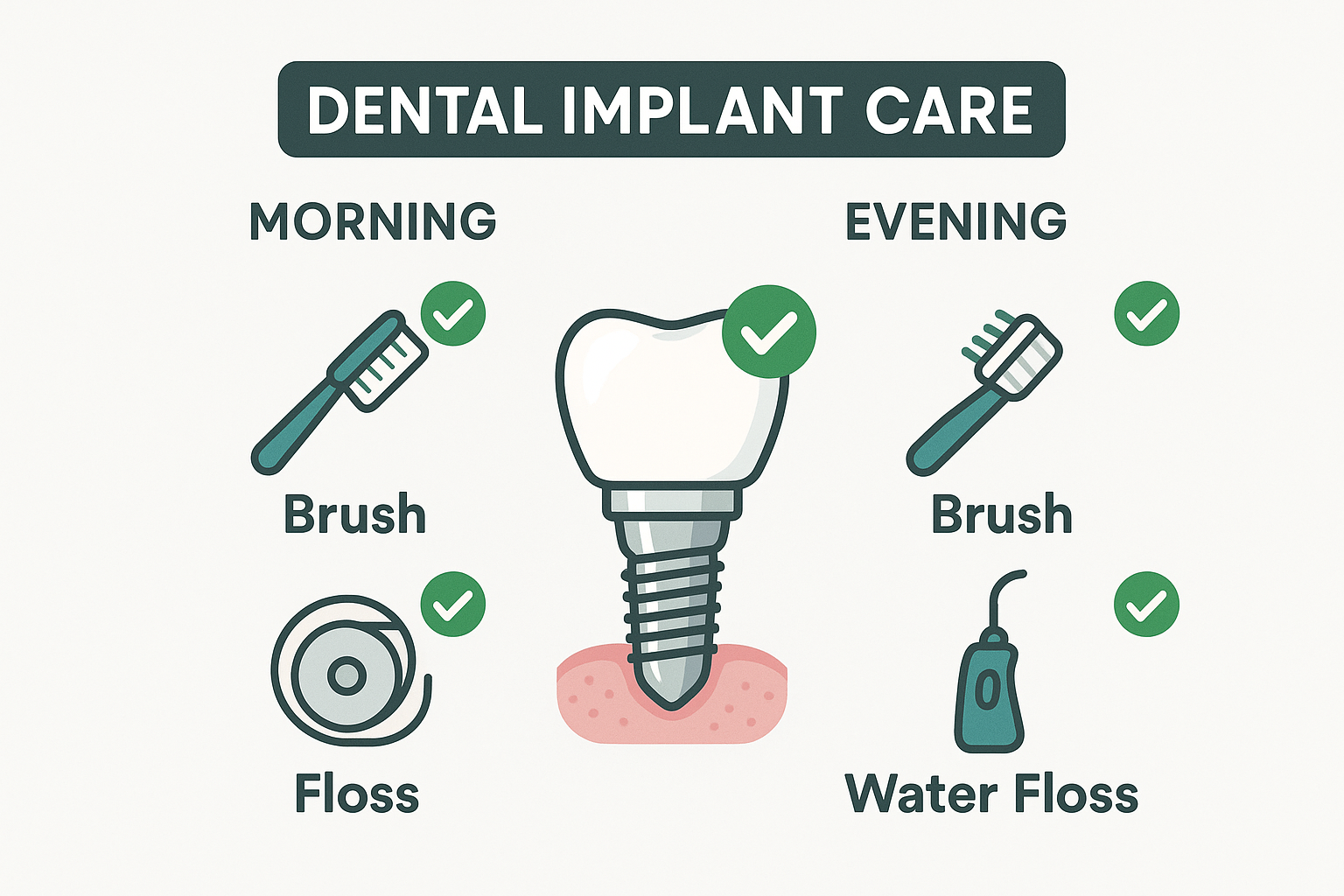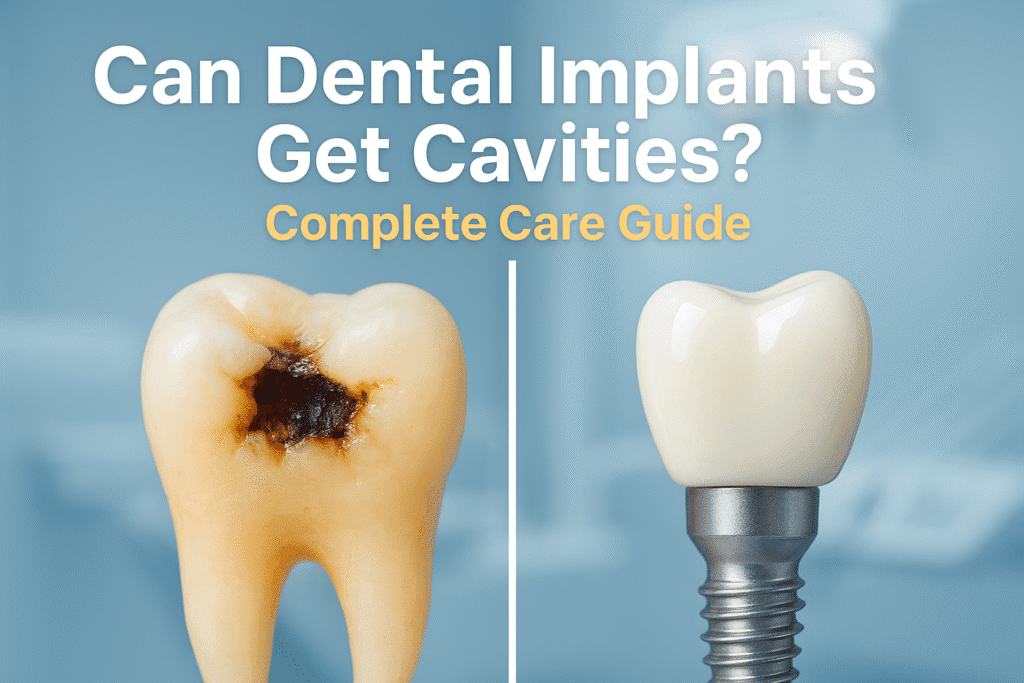Picture this: you’ve invested in dental implants to restore your smile with confidence, but now you’re wondering if your new teeth can develop cavities just like your natural ones. It’s a question that keeps many Dallas patients up at night, especially after making such a significant investment in their oral health. The good news? Dental implants cannot get cavities in the traditional sense because they’re made of titanium and ceramic materials that bacteria can’t penetrate. However, this doesn’t mean you can skip your oral hygiene routine—there’s much more to the story that every implant patient needs to know.
Key Takeaways
- Dental implants themselves cannot develop cavities because they’re made of biocompatible materials like titanium and ceramic
- Peri-implantitis is the real threat—a gum disease that can cause implant failure if left untreated
- Proper oral hygiene is still essential to protect the surrounding gums and bone that support your implant
- Regular dental checkups remain crucial for monitoring implant health and preventing complications
- Natural teeth adjacent to implants can still get cavities and require ongoing protection
Understanding Dental Implant Structure
To understand why dental implants can’t get cavities, let’s break down what makes up your implant:
The Three Components of a Dental Implant
- Titanium Post 🦴 – Acts as the artificial tooth root, surgically placed into your jawbone
- Abutment – The connector piece that attaches to the implant post
- Crown – The visible tooth-like restoration, typically made of ceramic or porcelain
Unlike natural teeth, which have enamel that can be weakened by acid-producing bacteria, dental implants are constructed entirely from materials that resist bacterial penetration. Your natural tooth enamel contains minerals that bacteria can break down, creating the holes we call cavities. Implant materials simply don’t have this vulnerability.
Can Dental Implants Get Cavities? The Scientific Answer
The short answer is no—dental implants cannot develop cavities because cavity-causing bacteria cannot penetrate titanium or ceramic materials. Here’s why:
Why Natural Teeth Get Cavities
- Bacteria feed on sugars and starches in your mouth
- They produce acids that weaken tooth enamel
- Over time, these acids create holes (cavities) in the tooth structure
- The organic nature of tooth enamel makes it susceptible to bacterial damage
Why Implants Are Different
- Titanium posts are completely inorganic and bacteria-resistant
- Ceramic crowns have a non-porous surface that bacteria can’t penetrate
- No nerve tissue means no internal pathways for bacteria to exploit
- Biocompatible materials are specifically chosen for their resistance to bacterial colonization
The Real Threat: Peri-Implantitis
While your implant crown can’t get cavities, there’s a more serious concern every implant patient should understand: peri-implantitis. This condition affects the tissues surrounding your implant and can lead to implant failure if not properly managed.
What Is Peri-Implantitis?
Peri-implantitis is essentially gum disease that specifically affects dental implants. It occurs when bacteria accumulate around the implant site, causing:
- Inflammation of the gums around the implant
- Bone loss that supports the implant
- Bleeding and swelling at the implant site
- Potential implant failure in severe cases
Signs to Watch For 🚨
- Bleeding when brushing around the implant
- Swelling or tenderness in the gums
- Bad taste or odor around the implant
- Visible recession of gum tissue
- Loose feeling in the implant
If you notice any of these symptoms, it’s crucial to contact your Dallas dental team immediately. Early intervention can often save your implant and prevent more serious complications.
Essential Care for Your Dental Implants

Just because dental implants can’t get cavities doesn’t mean you can neglect your oral hygiene. Proper care is essential for long-term success:
Daily Maintenance Routine
Morning and Evening:
- Brush gently around the implant with a soft-bristled toothbrush
- Use fluoride toothpaste (it won’t hurt your implant and helps protect adjacent natural teeth)
- Floss carefully around the implant site
- Consider using an antimicrobial mouthwash
Weekly Deep Cleaning:
- Use a water flosser specifically designed for dental implants to remove bacteria from hard-to-reach areas
- Gentle massage of gums around the implant site
Professional Care Schedule
- Regular checkups every 6 months minimum
- Professional cleanings with tools safe for implants
- X-rays to monitor bone levels around the implant
- Periodontal assessments to catch early signs of peri-implantitis
For comprehensive guidance on maintaining your implant health, explore our detailed dental implant crown care recommendations.
Natural Tooth vs Dental Implant: Cavity Risk Comparison
Protecting Adjacent Natural Teeth
Here’s something many patients overlook: while your dental implant can’t get cavities, your natural teeth absolutely can—and they need extra protection when you have implants.
Why Adjacent Teeth Are at Risk
- Changed cleaning patterns around the implant site
- Potential plaque buildup in hard-to-reach areas
- Neglecting areas that feel “different” after implant placement
- Assuming implants protect nearby teeth (they don’t)
Protection Strategies
- Maintain consistent brushing of all teeth, not just around the implant
- Use fluoride toothpaste to strengthen natural tooth enamel
- Regular flossing between natural teeth and around implant sites
- Professional fluoride treatments during dental visits
Common Myths About Dental Implants and Cavities
Let’s clear up some misconceptions that circulate among patients:
❌ Myth: “If implants can’t get cavities, I don’t need to brush them”
✅ Truth: Implants require meticulous cleaning to prevent peri-implantitis and protect surrounding tissues.
❌ Myth: “Implants make my other teeth cavity-proof”
✅ Truth: Natural teeth remain vulnerable and need the same level of care as before.
❌ Myth: “I can skip dental visits if my implants feel fine”
✅ Truth: Regular professional monitoring is essential for early detection of problems.
❌ Myth: “Antibacterial mouthwash can replace proper brushing for implants”
✅ Truth: Physical plaque removal through brushing and flossing remains irreplaceable.
When to Seek Professional Help
Understanding when to contact your Dallas dental team can make the difference between a minor issue and major complications:
Immediate Attention Required 🚨
- Severe pain around the implant site
- Visible pus or discharge
- Implant feels loose or moves when touched
- Significant swelling that doesn’t improve
Schedule an Appointment Soon
- Persistent bleeding when cleaning around the implant
- Bad taste that doesn’t go away
- Gum recession around the implant
- Difficulty cleaning the area effectively
If you’re experiencing any concerning symptoms, don’t wait. Early intervention is key to preserving your implant investment. Learn more about preventing dental implant rejection and maintaining optimal oral health.
Recovery and Long-term Care Considerations

The journey doesn’t end when your implant is placed. Understanding proper recovery and long-term care helps ensure your investment lasts a lifetime:
Immediate Post-Surgery Care
During the initial healing period, avoiding common dental implant recovery mistakes is crucial for success. This includes:
- Following prescribed medication schedules
- Avoiding hard foods during healing
- Gentle cleaning around the surgical site
- Using salt water rinses as recommended
Managing Discomfort
While some discomfort is normal, understanding when dental implant throbbing pain is normal versus when it signals a problem helps you make informed decisions about your care.
The Role of Lifestyle Factors
Your daily habits significantly impact implant longevity, even though dental implants can’t get cavities:
Beneficial Habits ✅
- Non-smoking lifestyle – Dramatically improves healing and long-term success
- Balanced nutrition – Supports bone health around the implant
- Stress management – Reduces teeth grinding that can damage implants
- Regular exercise – Improves circulation and healing
Habits to Avoid ❌
- Smoking or tobacco use – Significantly increases failure risk
- Excessive alcohol consumption – Can interfere with healing (learn about alcohol after dental implant surgery)
- Using teeth as tools – Can damage both implants and natural teeth
- Neglecting stress – Can lead to grinding and implant damage
Advanced Care Techniques
For patients committed to optimal implant health, consider these advanced care strategies:
Professional Treatments
- Specialized implant cleanings with ultrasonic devices
- Antimicrobial therapy for early peri-implantitis
- Laser therapy for gum health maintenance
- Custom night guards to protect against grinding
Home Care Enhancement
- Water flossers designed specifically for implants
- Interdental brushes for thorough plaque removal
- pH-balanced mouthwashes to maintain optimal oral environment
- Probiotic supplements to support beneficial oral bacteria
Financial Protection of Your Investment
Dental implants represent a significant investment in your oral health and quality of life. Protecting this investment goes beyond just preventing cavities:
Insurance and Warranty Considerations
- Understand your implant warranty terms and conditions
- Maintain required follow-up appointments to preserve warranty coverage
- Document any issues promptly with your dental team
- Keep detailed records of all maintenance and care
Cost of Complications
While dental implants can’t get cavities, complications like peri-implantitis can be expensive to treat. Prevention through proper care is always more cost-effective than treatment of advanced problems.
Looking Toward the Future
Dental implant technology continues to evolve, with new materials and techniques constantly improving success rates:
Emerging Technologies
- Improved surface treatments for better bone integration
- Smart materials that resist bacterial adhesion
- Advanced imaging for better treatment planning
- Minimally invasive techniques for faster healing
Staying Current
Your Dallas dental team stays updated on the latest advances to ensure you receive the best possible care throughout your implant journey.
Conclusion
The answer to “can dental implants get cavities” is definitively no—but this doesn’t mean you can neglect your oral health. While your titanium and ceramic implant components are immune to cavity-causing bacteria, the surrounding tissues require diligent care to prevent peri-implantitis and ensure long-term success.
Your journey to a confident smile doesn’t end with implant placement—it evolves into a partnership with your Dallas dental team focused on maintaining your investment for life. By understanding the unique care requirements of dental implants, staying vigilant for warning signs, and maintaining excellent oral hygiene, you can enjoy your restored smile for decades to come.
Ready to take the next step in your dental implant journey? Whether you’re considering implants or need guidance on caring for existing ones, our experienced Dallas team is here to help. Contact us today to schedule your consultation and discover how we can help you smile with confidence for years to come.
Remember: while dental implants can’t get cavities, they deserve the same level of care and attention you’d give your natural teeth. Your smile—and your investment—depends on it.


Leave a Reply
Share your thoughts or ask a question about dental implants. Your email address will not be published.